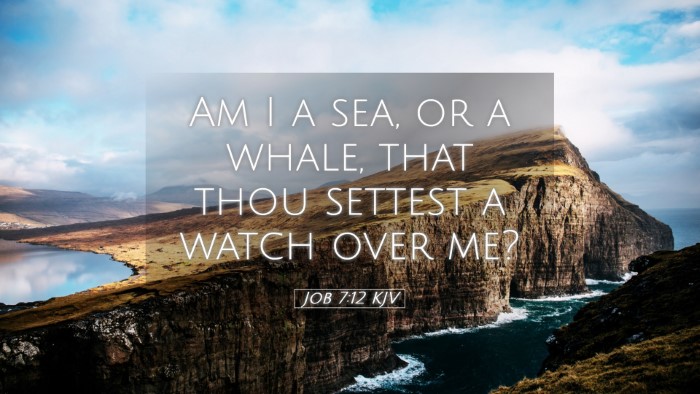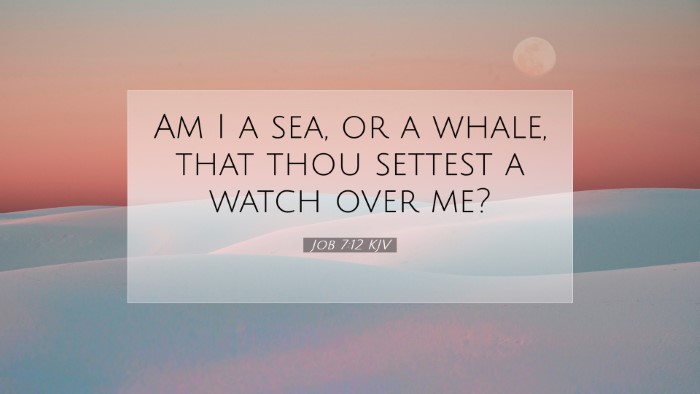Old Testament
Genesis Exodus Leviticus Numbers Deuteronomy Joshua Judges Ruth 1 Samuel 2 Samuel 1 Kings 2 Kings 1 Chronicles 2 Chronicles Ezra Nehemiah Esther Job Psalms Proverbs Ecclesiastes Song of Solomon Isaiah Jeremiah Lamentations Ezekiel Daniel Hosea Joel Amos Obadiah Jonah Micah Nahum Habakkuk Zephaniah Haggai Zechariah MalachiJob 7:12
Job 7:12 KJV
Am I a sea, or a whale, that thou settest a watch over me?
Job 7:12 Bible Commentary
Commentary on Job 7:12
Verse Context: Job 7:12 states, “Am I a sea, or a whale, that thou settest a watch over me?” Here, Job is expressing his profound sense of isolation and confusion regarding his suffering, using vivid imagery.
Overview of Job's Dilemma
In the Book of Job, we find a narrative that explores the themes of suffering, justice, and faith. Job's experiences lead him to question his place in God’s creation and the nature of divine oversight.
The Meaning of “Sea” and “Whale”
Job’s reference to the “sea” and “whale” signifies chaos and formidable power. In ancient Near Eastern literature, the sea often represents untamed forces, while the whale, being among the largest creatures of the sea, evokes thoughts of domination and the unknown.
- Imagery of the Sea: In the Scriptures, the sea can symbolize the people’s tumult—unpredictable and often hostile (as seen in Psalm 46:3).
- Whale as a Symbol: The whale is a majestic beast representing both awe and danger, highlighting Job’s feeling of being watched over in a threatening manner.
Job's Perception of Divine Surveillance
Job's rhetorical question implies his desperate search for understanding and perhaps a feeling of being unnecessarily monitored. This portrays God as someone who has set a watch over Job's actions, suggesting an examination that feels both excessive and suffocating.
- God's Sovereignty: Job acknowledges God’s sovereignty yet struggles with the idea that God would scrutinize him like a wild beast, leading to an inner conflict regarding justice and divine purpose.
- Job’s Isolation: His isolation is palpable; he feels alienated—not just from humanity, but from God himself.
Theological Insights from Public Domain Commentaries
Matthew Henry's Commentary
Matthew Henry emphasizes that Job, in his great distress, feels like a creature of chaos, over which God watches with scrutiny. This highlights human vulnerability and the transcendent nature of God. Job feels as though he is not only being watched but scrutinized for wrongdoing when in fact he has remained faithful.
Albert Barnes' Insights
Albert Barnes notes that Job’s lament conveys the sense of incessant turmoil within his soul, questioning why God would treat him like a monster. Barnes suggests this addresses the broader theme of suffering and the uncertainty of God's management of the world. Job's question is both an expression of his sorrow and a theological inquiry into divine oversight.
Adam Clarke’s Perspective
Adam Clarke comments on the metaphorical language used by Job. He suggests that the “watch” Job mentions might not be limited to a protective oversight but implies a sense of control and dominance. Clarke interprets this as a call to understand the implications of divine justice—watching not as an encouraging protector but as an omnipotent observer ready to judge.
Applications for Today's Believer
Job 7:12 invites believers to reflect on their own understandings of suffering and the nature of God’s presence in times of distress. It raises essential questions about human anguish and divine oversight.
- Reflection on Suffering: Believers are encouraged to contemplate their own suffering in light of God's nature and purposes.
- The Nature of God's Care: Are we seeing God's surveillance as caring or controlling? This verse invites a reassessment of how we interpret divine action in our lives.
- Hope in Vulnerability: Job ultimately wrestles with his feelings but remains engaged with God. This interaction is vital for a faith that encourages questions and acknowledges suffering.
Conclusion
Job 7:12 is a powerful reminder of the complexity of faith amidst suffering. It challenges pastors, students, theologians, and scholars to explore the depths of their understanding regarding God’s presence during trials, the significance of divine watchfulness, and the human experience of feeling both small and scrutinized in the vast creation of God.


